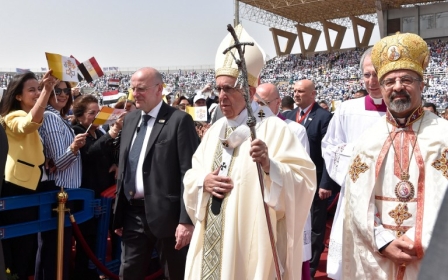Anti-Islamic State coalition meets to assess campaign
Key members of the US-led coalition fighting the Islamic State group in Iraq and Syria meet in Copenhagen on Tuesday to assess the campaign's next steps as the militants' "caliphate" collapses.
Though officials warn that military action will continue for some time, they are generally upbeat about the progress and quickening momentum of the fight.
After months of brutal, street-by-street combat, IS has now lost control of most of its stronghold of Mosul in Iraq, while the militants have become largely isolated in their Syrian bastion of Raqqa.
Pentagon chief Jim Mattis and his Danish counterpart Claus Hjort Frederiksen are among the senior leaders from 15 countries attending Tuesday's summit.
"We're going to look to the future, determine what more is needed, if anything," Mattis told reporters ahead of his arrival in Denmark.
'We're going to look to the future, determine what more is needed, if anything'
- Jim Mattis, Pentagon chief
Several coalition countries are keeping a nervous eye on the region as IS-held territory diminishes.
Thousands of foreign fighters remain in Iraq and Syria, and coalition nations - particularly in Europe - are bracing for a possible wave of battle-hardened militants returning home.
According to a senior US administration official, Interpol has identified 14,000 foreign fighters it knows has travelled to Syria and are still alive.
The largest numbers come from Tunisia, followed by Saudi Arabia.
Thousands more have travelled from Europe, including 100 or so from Denmark, said the official, who asked not to be named.
The international law enforcement agency Interpol is now part of the anti-IS coalition, becoming the alliance's 68th member.
Bombs in cupboards
The campaign against IS began in autumn 2014 and has seen the Iraqi security forces – backed with coalition training and air power - reverse humiliating losses and recapture several key cities including Ramadi and Fallujah.
Iraq's second city Mosul is now mainly back under Iraqi control, though IS continues to hold the Old City on the west side, where its fighters are preparing for a bloody last stand.
In Syria, coalition-backed Kurdish and Arab forces have been gradually recapturing towns and villages, with the focus now on isolating Raqqa ahead of a major offensive to seize back the city after more than two years of militant rule.
US President Donald Trump came to power on a pledge to destroy IS.
Though much of the groundwork had already been laid and the coalition has conducted thousands of strikes, US military leaders credit Trump with delegating them greater authority, enabling a quickening pace of operations.
Critics say the additional strikes have accelerated the rate of civilian deaths.
The administration official said one request for the coalition would be for more de-mining support to help clear areas abandoned by IS.
The militants have rigged explosives to homes, buildings and even the doors on people's cupboards, and clearing these bombs and mines is a massive undertaking.
Officials also want quicker access to funds and resources to help with stabilising and protecting areas after IS has left.
New MEE newsletter: Jerusalem Dispatch
Sign up to get the latest insights and analysis on Israel-Palestine, alongside Turkey Unpacked and other MEE newsletters
Middle East Eye delivers independent and unrivalled coverage and analysis of the Middle East, North Africa and beyond. To learn more about republishing this content and the associated fees, please fill out this form. More about MEE can be found here.




